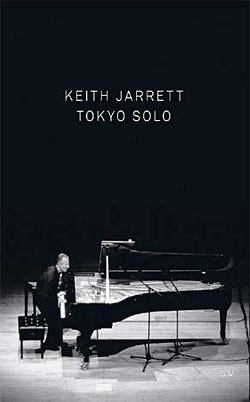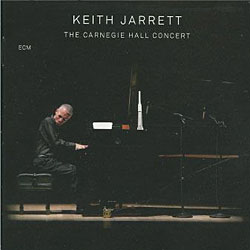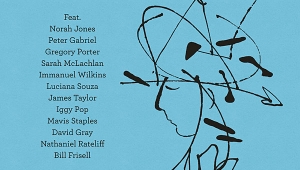| Columns Retired Columns & Blogs |
Recordings of October 2006: Tokyo Solo & The Carnegie Hall Concert
KEITH JARRETT: Tokyo Solo & The Carnegie Hall Concert
Tokyo Solo
Keith Jarrett, piano
ECM DVD 5501 (DVD). 2006. Kaname Kawachi, dir.; Martin Pearson, eng. 16:9. Dolby Digital Stereo & 5.1, DTS 5.1. TT: 110:48
The Carnegie Hall Concert
Keith Jarrett, piano
ECM 1989/90 (2 CDs). 2006. Keith Jarrett, Manfred Eicher, prods.; Martin Pearson, eng. DDD. TT: 110:23
 With last year's Radiance, Keith Jarrett returned to the epic solo-piano improvisations for which he's been famous for 33 years. But with a difference—instead of continuous improvisations lasting almost an hour, Jarrett now stopped when the music stopped, or simply when he had no more to say. This is admirably honest, but I was leery. It seemed that Jarrett was able to reach the heights of such landmark solo albums as Bremen/Lausanne, The Köln Concert, and Sun Bear Concerts only through his commitment to the long improvisational form—by simply going on until stopped by exhaustion. If this meant risking his own and his audience's occasional boredom, the price seemed small. Radiance seemed to justify my suspicions. It has many passages of brilliance and remarkable variety, but still sounds to me choppy, often labored and churning.
With last year's Radiance, Keith Jarrett returned to the epic solo-piano improvisations for which he's been famous for 33 years. But with a difference—instead of continuous improvisations lasting almost an hour, Jarrett now stopped when the music stopped, or simply when he had no more to say. This is admirably honest, but I was leery. It seemed that Jarrett was able to reach the heights of such landmark solo albums as Bremen/Lausanne, The Köln Concert, and Sun Bear Concerts only through his commitment to the long improvisational form—by simply going on until stopped by exhaustion. If this meant risking his own and his audience's occasional boredom, the price seemed small. Radiance seemed to justify my suspicions. It has many passages of brilliance and remarkable variety, but still sounds to me choppy, often labored and churning.
Radiance's last four tracks were excerpts from a concert that has now been released, only on DVD (ECM's first), as Tokyo Solo, and it seems they were selected for their similarity to the rest of Radiance—which only added to that album's doggedness. But the complete Tokyo Solo, and now The Carnegie Hall Concert, both in the new short-improvisation form, are something different. Heard now in their proper context and order, even those four Tokyo tracks originally released on Radiance shine with greater radiance of their own.
The typical description (mine too) of a Jarrett solo concert quickly devolves into a breathlessly listed menu of some indigestible smorgasbord of influences: Prokofiev, Shostakovich, and Brahms meet Gershwin, Earl Hines, and a churchful of gospel organists in a mlange of Irish ballads and jazz standards with detours into bebop and the modal musics of the Middle East. But such descriptions too easily mislead the reader new to Jarrett's music into thinking he plays superficial pastiche. While all of those influences, and more, can be heard in these two sets, what is new is that now all of them are so often combined in a single coherent musical language.
Where in past decades Jarrett might have presented a series of seamless (or seamful) segues—from Chopinesque nocturnal musings to Thelonious Monk–like crepuscule to long-lined ragas to Messiaenic carillons in rhythms as dense as Nancarrow's works for player piano—in Tokyo and Carnegie these are more often heard all at once. The result is not a babel of mutually unintelligible musical tongues, but one clear voice of maximal allusion singing in many musical accents. Each accent may be indicated with only a grace note of exactly the right weight and placement in time, or a bluesy cast to the inner voicing of an otherwise European-sounding chord, or, after a long ostinato passage of on-the-beat rhetoric, an easing into American syncopation as sudden as it is subtle.
This can't be done at all without three things: an omnivorous musical mind, the ability to thoroughly digest every one of those exotic musical cuisines, and towering technique. Jarrett has all three, and impeccable subtlety and taste. With his complete control of dynamics, rubato, and singing line, the result is a unique combination of thoroughly European high seriousness married to distinctly American senses of humor, play, guts, and swing: fiercely delighted work undertaken with no hint of labor.
 If Tokyo Solo is a big step past Radiance in quality and in Jarrett's ease with his new short form, The Carnegie Hall Concert, recorded in September 2005, is suffused in what sounds and feels like the glow of triumph for both Jarrett and his audience (whose ecstatic applause accounts for 20:31 of the set's total playing time). They are equally—and highly—recommended, but they differ markedly. Tokyo is darker, more interior, more sober in tone. Carnegie is more warm and celebratory, more rooted in blues and jazz—in a word, more American, though this is as much the America of Ives, Barber, and Ruggles as of Gershwin, Kern, and Miles Davis.
If Tokyo Solo is a big step past Radiance in quality and in Jarrett's ease with his new short form, The Carnegie Hall Concert, recorded in September 2005, is suffused in what sounds and feels like the glow of triumph for both Jarrett and his audience (whose ecstatic applause accounts for 20:31 of the set's total playing time). They are equally—and highly—recommended, but they differ markedly. Tokyo is darker, more interior, more sober in tone. Carnegie is more warm and celebratory, more rooted in blues and jazz—in a word, more American, though this is as much the America of Ives, Barber, and Ruggles as of Gershwin, Kern, and Miles Davis.
Both are rich in encores. Tokyo has "Danny Boy," full of heart and empty of sentimentality; "Old Man River," which begins as a meditation for the piano's top two octaves before moving into stately rolling gospel and Mozartean counterpoint; and "Don't Worry 'Bout Me," a heartbreaker from its first quiet triads to its final enharmonic dusting of notes like fallen stars. Carnegie's five encores are a rare Jarrett composition, "Paint My Heart Red," from Munich Concerts, long out of print; Jarrett's most famous tune, "My Song"; the standard "Time On My Hands"; and two more improvisations.
The sound on both is ECM's usual sumptuous three-dimensionality. Jarrett's Steinway is by turns warm, pealing, and appropriately chalky in the top octave, while the lower octaves are so rich, warm, and perfectly tuned that they sometimes sound like an organ. The five microphones—three more or less in the piano, two at the lip of the stage—give an up-close, pianist's-ear view that nevertheless shouldn't bother the aural claustrophobe. On the tracks shared with Radiance, the CD sound is a bit harsher in the highs than the Tokyo DVD's Dolby Digital.
These two sets map new territory for Keith Jarrett and for us, and newer, higher levels of expressiveness and accomplishment. For anyone who loves this sort of music, Jarrett has always been its only purveyor, and these are the best things he's ever done. Buy both and feel grateful that so few dollars can buy so much uncompromised delight.—Richard Lehnert
- Log in or register to post comments




































